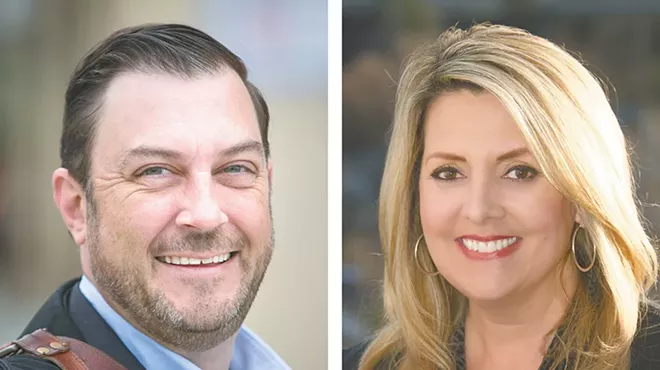
It's January when a fight breaks out at the entrance of the downtown Spokane library. Security guard Tyler Gulliford is escorting a homeless man named Utrillo Morris. Morris wouldn't stop rapping loudly along to his music, so Gulliford asked him to leave.
But before he exits, Morris throws his bottle of water at the guard. And then as Morris turns away, the security guard reaches out and either shoves or touches Morris's shoulder, the grainy security camera footage shows. Morris then spins around and starts throwing punches. Gulliford goes to the hospital with a sore jaw and ribs. Morris goes to jail.
For a time, that's the end of it. But then in May, mayoral candidate Nadine Woodward uploaded part of the surveillance video to social media as a symbol of how unsafe downtown and the library had become. "Our beautiful library has turned into a transient center, and that's NOT ok!"
Her critics accuse her of fearmongering. Her supporters echo her concerns.
It's June at the same entrance to the library. It's chaos. The entrance is packed with lines of parents and their kids. The crowd is surrounded by "angels," men and women dressed in white, sheet-covered wings jutting high above to block the view of protesters.
The protesters are denouncing Drag Queen Story Hour — a public library-sponsored storybook reading starring drag queens — and holding signs that reference misogyny, the rosary, abortion, hell, pedophilia, and, of course, protecting the children.
In the last few months, the Spokane Public Library has faced battles on multiple fronts. The fights aren't over books. It's over the people — the homeless patrons, the drag queens, the protesters and the politicians. It's over the library entrance — about who can come in and who has to leave.
And as election season ramps up, local politicians are discussing increased security and even banning homeless people altogether from the library.
BLUE LIGHT DISTRICT
The challenges facing the downtown Spokane library are illuminated the instant you enter one of the men's bathrooms. Everything, including the signs warning that "the use of drugs and alcohol in our facilities is strictly prohibited," is bathed in a noirish blue light. The blue lights, first tested last year, make it harder to see your veins and use the library bathroom stalls to inject heroin.
Woodward sees another problem: The sheer number of homeless people using the library.
"I was very surprised by the number of homeless people on the second floor," Woodward says. "There were dozens and dozens of them, sprawled out with their backpacks and bed rolls and luggage, occupying just about every computer in the library."
Woodward hasn't personally felt unsafe in the library. But she has felt unsafe downtown. Earlier this year, she says, a mentally ill man started screaming profanity at her and followed her to her car. A key part of Woodward's campaign message rests on the idea that, in the last few years, there's been an explosion in homelessness, garbage and danger across downtown.
The Inlander spent more than eight hours in the downtown library working on this story, and we did see library patrons with scraggly beards, disheveled clothes and sleeping bags draped over their shoulders, though no more than in a downtown Starbucks, the Spokane Transit Authority Plaza or a public park. At one point, a woman with a massive bag argues loudly with security over her lost cell phone. At another, a man in a gray hoodie grouses when a staff member forces him off a library computer.
But there are also plenty of homeless patrons like Mickel Clemons. Clemons has bookmarked his place in the 860-page David Weber sci-fi epic he's reading with an expired STA bus pass.
"For me, it's a place where I can sit and read without being disturbed most of the time," Clemons says.
Woodward draws a straight line between homeless patrons, drug injections and a threat to public safety.
"How do you separate the people there who are homeless who aren't shooting up drugs and the homeless who are shooting up drugs?" Woodward says. "I just think the library has to be a safe place. And I don't think it's become a safe place."
For decades, fights over the homeless in public libraries have cropped up in major cities. Ryan Dowd, author of The Librarian's Guide to Homelessness and the director of a large Illinois homeless shelter, says that as homelessness grows across the West Coast, that conflict has intensified.
"When you ban homeless people from everywhere else, they've got to go somewhere," Dowd says. "So they go to go the library and piss off middle-class people."
He says he saw news articles about the video that Woodward shared.
"One security guard got attacked by one homeless person, so homeless people are a problem?" Dowd says of the incident in Spokane. "That's just one step removed from racism."
In fact, other than Woodward's footage, Spokane library director Andrew Chanse isn't aware of any serious act of violence occurring in the downtown library.
"I've been here six years," Chanse says, "and that's the only time that's happened."
There are plenty of police calls associated with the library, but police officials urge caution about relying too much on that data: Those numbers can sometimes include incidents that happen at the Community Court — held in the same building — or on the busy sidewalk outside.
Ironically, one of the reasons people like Clemons come to the library everyday is because it's safe.
"I feel safer here than I do at, say, House of Charity," Clemons says, referring to the downtown homeless shelter. "For the most part, I don't ever feel threatened here."
But Woodward says people tell her things: She says she's heard two different librarians tell her that young parents need to keep their children by their side, "because the library is not safe for young children." She's heard a field trip chaperone took young boys into the library bathroom, where they witnessed a man shooting up drugs. She says she heard that after the blue lights were installed "that homeless people are protesting by defecating in the sink, because they want the blue lights taken out."
Woodward won't tell the Inlander who told her these things — she says her sources told her these things in confidence. "They don't want to be vilified in the public," Woodward says.
"I think the library is struggling to get a handle on this. And until they get a handle on this, maybe the homeless shouldn't be allowed in the library."
Meanwhile, library administrators express skepticism toward Woodward's claims. They haven't heard of any librarians claiming the library is unsafe. Sure, someone recently pooped in the sink, but someone had also pooped in the sink before the blue lights were installed. There's no reason to believe the lights had anything to do with it, library spokeswoman Amanda Donovan says.
"It's not 'protest poop,'" Donovan says. "We've been laughing a little bit about that [claim]."
City Council President Ben Stuckart, who's also running for mayor, says Woodward's claims that the library has become an unsafe transient shelter is "absolute bullshit."
"That's harmful to the library to spread this paranoia and fear," he says.
Mayoral candidate Shawn Poole also called Woodward's tweet with the security footage "fearmongering" and argued she's playing politics. But he's sympathetic to the underlying concern. If people are afraid to go to the library, that's a problem, whether it's actually unsafe or not, he says.
"If there's even one person out there that doesn't think the downtown library is safe, then we owe it to them to either change their perception or make it safe for everybody," Poole says.
A HOMELESS BAN?
At this point, Woodward says she isn't outright advocating banning homeless people from the library. But she also says she's "throwing that out as a possibility."
"Where we are now with the drug use in the library by the homeless people who are addicted on the street, this is not a good situation," Woodward says. "Quite frankly, I think the library is struggling to get a handle on this. And until they get a handle on this, maybe the homeless shouldn't be allowed in the library. ... That may be something that we have to look at."
Stuckart is aghast. Would you check everyone's home address before they're allowed to come in?
"You don't get to say who gets to go into the library or not. It's everybody's library," Stuckart says. "You don't get to say, 'Only rich people can use the Spokane Public Library.'"
Either way, a straight-up homeless ban would likely be illegal. Courts have repeatedly found that access to the information in the library is protected by the First Amendment.
"If we wish to shield our eyes and noses from the homeless, we should revoke their condition, not their library cards," New Jersey federal Judge H. Lee Sarokin wrote in one famous 1991 case. Subsequent rulings have found that libraries can make prohibitions against specific behaviors, like body odors or the numbers of bags, but they have to be narrowly written and equally enforced.
"If we're going to keep the door open to them, we definitely have to have a higher level of security," Woodward says. Poole and Woodward both suggest upgrading library security by hiring a police or resource officer.
"It's a lot easier to build a relationship when you're wearing a cardigan than when you're wearing a [security] uniform."
But Dowd, the author and shelter operator, cautions that if they're not careful, too many security guards or police officers can inflame tensions, instead of calming them. Librarians are best suited to handle most of these encounters, he says.
"It's a lot easier to build a relationship when you're wearing a cardigan than when you're wearing a [security] uniform," Dowd says.
Stuckart argues that a police officer in the library is a police officer who isn't patrolling the streets. He says he wouldn't want to cut library hours or fire librarians to pay for more security in a library he already believes is safe.
Instead, he supports a proposal to install safe needle-disposal containers inside the bathroom stalls. He calls for requiring all city-funded shelters to be 24/7 and staffed by caseworkers; otherwise, you get homeless people flooding into Starbucks and the library simply to have a warm place to stay during the day.
But homelessness is just one controversy the library has had to contend with.
DRAG AND DOGMA
A crowd of children sit on the downtown library floor on Saturday afternoon. Far-right journalists from publications like the John Birch Society's New American are observing and videotaping as Andrea Tate's drag queen persona — Tirrany Hex — reads to them in a white, high-collared wedding-style dress.
Drag Queen Story Hour was intentionally scheduled, promoted and sponsored by the Spokane Public Library as part of celebrating the community's diversity during Pride Week.
Tate comes out to the song "Drag is Magic," as the kids sing along to lyrics like, "Drag is dress-up for girls and boys" and "drag is for you, and drag is for me, drag is for everyone." None of the books the drag performers read talk about sex or drag, but instead focus on celebrating diversity. One of the books, A Family is a Family is a Family, includes two dads — but also a number of other traditional and nontraditional family structures. Not All Princesses Dress in Pink celebrates girls using power tools and playing in mud puddles. The Princess and the Pony features an unconventional princess and a farting pony.
But that doesn't stop protesters from claiming that drag is inherently sexual, that the performances will confuse children's gender identity, or that drag queens are perverts trying to propagandize children.
Indeed, as some conservatives look at homelessness and pronounce that our cities are dying, some conservatives point to Drag Queen Story Hours and declare that our culture is collapsing.
City Councilman Mike Fagan — a conservative running for council president — says that, on the one hand, Drag Queen Story Hour is First Amendment speech. On the other, though, he hands the Inlander an op-ed written by local activist Anna Bohach, creator of the "500 Mom Strong" anti-drag Facebook group. Bohach decries drag performances as misogynistic, arguing they're tantamount to blackface.
"I stand by her statement 100 percent," Fagan says. Fagan speaks almost gleefully about being able to use left-wing language against liberals.
"If the left side wants to say that they're 'woke,'" Fagan says, "I think the right side is saying, 'We're woke, too.'"
Bohach's feminism is the sort that condemns abortion as a tool for the "socialist patriarchy" to oppress women. She was offended by Mrs. Doubtfire, too. Women crossdressing as men is just as bad, she argues. She says she first heard the feminist critique of drag in her women's studies class when she attended California State University-Los Angeles. Indeed, it's not hard to find feminists — and even drag queens — critiquing certain drag tropes as sexist.
"What does that say to my daughter, when men parade around in makeup and mock femininity, and mock everything that it means to be a woman?" Bohach says.
But Tate says that argument is ridiculous when applied to Spokane's Drag Queen Story Hour. For starters, she's not a man. Neither is Kai Lockhart, who performed as a "drag king" on Saturday dressed in a suit jacket and facial hair makeup. Instead, both were assigned female at birth and both now identify as nonbinary.
The comparison to blackface is particularly offensive to Tate and several of the other drag queens. Drag is an artform resurrected by an oppressed minority — gay men — Tate says.
"I personally am done with letting drag be consigned to adult-only spaces," Tate says at a library panel discussion on the issue. "Because queer people have every right to exist outside of adult spaces."
She says the message of the event is about acceptance, about showing kids it's OK to dress how they like and be who they want to be as long as they're a kind person.
Others saw revolutionary potential in the event. At the library panel, Eastern Washington University gender studies professor Lisa Logan enthuses about the opportunity of "really critiquing gender normativity" while children "still have these wonderfully open minds."
"I think it has the potential to blow 'gender' wide open, which is part of why it's so scary," Logan says.
Local politicians have reacted to the debate in a slew of different ways. Stuckart leaps to the program's defense, condemning people who claim that drag queens are inherently deviant.
"I've met drag queens and hung out with drag queens before," Stuckart says. "I dressed up in drag one year for Halloween. ... So what. Get over it." (Stuckart later texts to clarify that, while he was crossdressing, he was not technically in drag.)
Woodward avoids wading into the controversy. "The library can have any program that it wants to," she says. "It's up to the people who like it or don't like it to attend it or protest it."
And while Poole takes a similar view, he also says he believes the library shouldn't have put on such a controversial event.
"Controversial issues need to be kept out of public spaces, especially places like the library," Poole says.
Occasionally offending people with ideas, Chanse counters, isn't just a risk of running a library, it's practically in the job description.
"Any time you're an organization that values intellectual freedom, you're going to have some controversy," Chanse says. "If we don't have something that offends you in our collection, maybe we're not doing our job." ♦


























